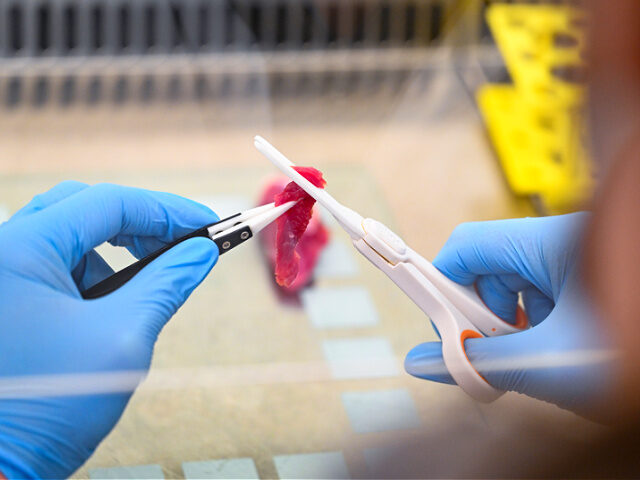Feb. 13 (UPI) — Less than a year after the U.S. Food and Drug Administration agreed that cultivated chicken is safe to eat, lab-grown meat faces legislation that could keep it off students’ plates nationwide.
U.S. Sens. Jon Tester, R-Mont., and Mike Rounds R-S.D., have introduced the School Lunch Integrity Act, which would prohibit cultivated meat from being served in the National School Lunch Program and the School Breakfast Program.
The bill (S. 3674) has been referred to the Committee on Agriculture, Nutrition and Forestry, where it is awaiting review. There is no companion bill in the House.
Rounds and Tester said in a release they oppose what is technically called cell-cultivated protein because of a lack of “USDA guidance” and a lack of “demonstrated studies showing the safety of lab-grown meat.”
“Montana ranchers grow the best meat in the world, that’s a fact — and our students ought to be getting the best in their school breakfasts and lunches every day,” Tester said.
“This common sense bill will make sure our schools can serve real meat from our ranchers, not a fake substitute that’s grown in a lab.”
Representing a “big meat” state, Tester previously introduced legislation to ban Paraguayan beef imports and suspend Brazilian beef imports. He’s also worked to pass bills like the Meatpacking Special Investigator Act and the American Beef Labeling Act, which reinstates mandatory country-of-origin labeling for beef.
Lab-grown meat has been available for purchase sporadically in limited amounts in Singapore and the United States since 2021, after companies like GOOD Meat went through regulatory steps toward bringing it to market.
In 2023, GOOD Meat, the cultivated meat division of food technology company Eat Just Inc., announced with Upside Foods they had received a “no questions” letter from the FDA, essentially agreeing their meat was safe to eat.
Just over 40 companies in the United States are working in the cultivated meat industry, including Aleph Farms Ltd., Finless Foods Inc., Future Meat Technologies Ltd., Memphis Meats and GOOD Meat.
Tom Rossmeissl, head of brand marketing for Eat Just Inc. and GOOD Meat, said the United States leads the world in alternative proteins, including cultivated meat, but that could change if bills like the ones like the senators’ move forward.
So far, GOOD Meat has only served its products in Singapore, where it offered dishes that ranged from crispy strips and curries to skewers and salads in 2020. In the United States, the company held several tasting dinners at a restaurant in Washington, D.C, China Chilcano, which is run by world-renown chef Jose Andres.
Presently, Rossmeissl said, the company is working on the challenging problems of scaling up, growing its impact and reducing costs.
“You know, this is the early stages of a new industry with a lot of promise. A lot of promises to solve a lot of problems — from food security to animal welfare to climate change,” he said.
“But it’s all so early. And, you know, we acknowledge and have acknowledged the uncertainty. We need to get a lot of things right to be able to get our costs down and be able to scale effectively in a way that can be competitive with conventional meat in the marketplace. It’s going to take some time.”
Some analysts predict cultivated meat could become a $25 billion global industry by 2030.
The Senate bill has been endorsed by the United States Cattlemen’s Association, R-CALF USA and the National Cattlemen’s Beef Association.
Ethan Lane, vice president of government affairs at National Cattlemen’s Beef Association, maintained that the federal government should not allow lab grown protein in school lunch and breakfast programs without knowing the long-term health effects on children.
“The lack of nutrition and allergen research related to lab grown proteins creates unnecessary risks for children, while traditional beef provides essential nutrients that provide health benefits to children,” Lane said.
“School cafeterias are not test labs, and we appreciate Sens. Rounds and Tester for standing up for our children and our cattle producers.”
Rossmeissl said global protein demand has increased by 50% since 2000, and it’s projected to double by 2050, so now is the time to be supporting more options for proteins, not fewer.
Also, he said, cultivated meat is still being produced in extremely small quantities and fairly costly to create, so it’s not available nationwide yet.
More locally, Florida Gov. Ron DeSantis said he would support two state bills, HB-435 and SB-586, that ban the sale of lab-grown meat across the state.
“The irony of this legislation in Florida is they’re looking to ban a food product that is not being sold in the state of Florida,” Rossmeissl said.
“This legislation and the school lunch bill at the federal level, it sends a really bad message to a really promising industry in which America has a really strong lead.”
Curt Chaffin, the director of policy for the Good Food Institute, a Washington, D.C.-based nonprofit think tank focused on alternative protein innovation, said the proposed bills in Florida would restrict consumer choice, stifle innovation and prevent new economic growth opportunities.
“The Breakthrough Institute estimates that alternative proteins like cultivated meat will create more than 200,000 jobs in the United States over the coming decades,” he said. “By banning the industry altogether, Florida would effectively close the door to new jobs and opportunities.”
Chaffin said dozens of cultivated meat companies are starting up around the United States, representing nearly one-third of the global industry, adding that by outlawing cultivated meat, the proposal would block American innovation and send new jobs and revenues overseas.
“This level of protectionism is unmatched in the state’s history and could spell the beginning of more and more government interference,” he said.

COMMENTS
Please let us know if you're having issues with commenting.